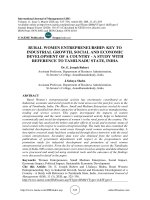Economic growth and economic development 215
Bạn đang xem bản rút gọn của tài liệu. Xem và tải ngay bản đầy đủ của tài liệu tại đây (44.51 KB, 1 trang )
Introduction to Modern Economic Growth
Acemoglu and Johnson (2005) investigate the relative roles of these two sets of
institutions. Their strategy is again to make use of the natural experiment of colonial history. What helps this particular unbundling exercise is that in the sample
of former European colonies, the legal system imposed by colonial powers appears
to have a strong effect on contracting institutions, but little impact on the available
measures of property rights institutions. At the same time, both mortality rates
for potential European settlers and population density in 1500, which we have seen
above as important determinants of European colonization strategy, have a large
effect on current property rights institutions, and no impact on contracting institutions. Using these different sources of variation in the sample of former European
colonies, it is possible to estimate the separate effects of contracting institutions and
property rights institutions.
Consistent with the pattern shown in Figure 4.13, which suggests that the identity of the colonizer is not a major determinant of future economic success of the
colony, the empirical evidence estimating the different sources of variation in colonial
history finds that property rights institutions are much more important for current
economic outcomes than contracting institutions. Countries with greater constraints
on politicians and elites and more protection against expropriation by these powerful
groups appear to have substantially higher long-run growth rates and higher levels of
current income. They also have significantly greater investment levels and generate
more credit for the private sector. In contrast, the role of contracting institutions
is more limited. Once the effects of property rights institutions are controlled for,
contracting institutions seem to have no impact on income per capita, the investment to GDP ratio, and the private credit to GDP ratio. Contracting institutions
appear to have some effect on stock market development, however.
These results suggest that contracting institutions affect the form of financial
intermediation, but have less impact on economic growth and investment. It seems
that economies can function in the face of weak contracting institutions without disastrous consequences, but not in the presence of a significant risk of expropriation
from the government or other powerful groups. A possible interpretation is that private contracts or other reputation-based mechanisms can, at least in part, alleviate
the problems originating from weak contracting institutions. For example, when it
201









